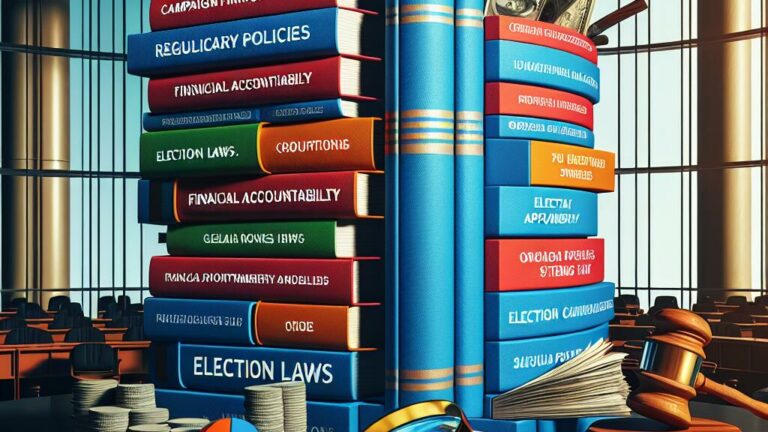Campaign Finance Reform and its Challenges
Table Of Contents
Understanding Campaign Finance Reform and Its Challenges in Today’s Political Landscape
Key Takeaways
- Insights into the alteration of campaign monetary regulations and its obstacles
- Fundamental elements of electoral funding legislation
- Recent trends in the funding of election campaigns
- Difficulties faced in the transformation of campaign financing
- Assessing the success of reforms in campaign finance
Campaign Finance Reform And Its Challenges | Understanding Campaign Finance Reform
Campaign finance reform plays a critical role in shaping political campaigns and ensuring fair elections. Understanding campaign finance reform and its challenges involves recognizing how campaign finance laws regulate the flow of campaign contributions and the influence of money in politics. The Bipartisan Campaign Reform Act of 2002 was a significant step toward addressing some of these concerns by imposing stricter limits on campaign contributions and enhancing transparency through better disclosure requirements. Despite these efforts, the regulation of campaign finance remains a contentious issue. The influence of wealthy donors and organizations such as Super PACs complicates the landscape, often overshadowing the voices of average citizens. Public financing of campaigns offers a potential solution to improve accessibility and reduce the growing costs of political campaigns, yet the debate surrounding effective campaign finance regulation continues to evolve.
Campaign Finance Reform and its Challenges | Definition and Importance of Campaign Finance Reform
Campaign Finance Reform and its Challenges address the critical intersection of money and electoral politics. This reform aims to establish a fairer landscape for election campaigns by regulating political contributions and limiting the influence of money in politics. The Federal Election Campaign Act serves as a cornerstone of these efforts, creating guidelines for political committees and promoting transparency in political advertising. The dialogue surrounding public financing of elections highlights the need for equitable access, allowing grassroots lobbying efforts to gain traction against well-funded opponents.
The importance of Campaign Finance Reform cannot be overstated, as it directly impacts the political agenda and the integrity of the democratic process. By addressing independent political expenditures and the rise of Super PACs, reform initiatives seek to mitigate the disproportionate influence of wealthy donors. Effective reform can enhance the public’s trust in electoral politics, ensuring that the voice of the average voter is not drowned out by massive political contributions. Comprehensive strategies are necessary to navigate the challenges posed by the current campaign finance landscape.
Historical Context of Campaign Finance Reform
The evolution of Campaign Finance Reform and its Challenges can be traced back to the early 20th century when various movements sought to address corruption in politics. The introduction of political action committees (PACs) ushered in a new era of election financing, allowing for the organized collection and distribution of funds to support candidates. These changes aimed to enhance political freedoms and protect the integrity of the democratic process. Over the decades, various legislatures have enacted multiple pieces of legislation intended to regulate campaign finance, often emphasizing the need for transparency and accountability in the electoral process.
The complexities surrounding campaign financing intensified leading up to significant elections, prompting reform efforts to adapt continuously to new realities. The rise of super PACs represents a pivotal challenge, as these organizations can raise unlimited sums from individuals and corporations, influencing elections at an unprecedented scale. Public funds were once seen as a viable solution to level the playing field, yet their limitations have often hindered their effectiveness. The ongoing debate continues to revolve around how best to balance financial contributions with maintaining a vibrant and equitable democracy.
Key Components of Campaign Finance Law
Campaign finance reform and its challenges encompass various regulations that govern how finances are raised and spent in political campaigns. These rules are crucial for ensuring fairness in elections, as they establish guidelines on fundraising practices, the involvement of political activists, and the influence of lobbying. Often, the campaign finance system aims to minimize the effects of wealthy donors on political views and policymaking. The effectiveness of campaign finance rules can significantly impact candidates’ abilities to fund their reelection efforts and the overall integrity of the ballot process. By addressing issues within the campaign finance framework, advocates work towards meaningful campaign reform that enhances transparency and reduces the sway of money in politics.
Regulations Governing Campaign Financing
Campaign finance regulation encompasses a variety of statutes that dictate how funds can be raised and spent in political campaigns. The complexities of these laws often lead to campaign finance struggles, as candidates navigate various restrictions and requirements. Recent campaign finance proposals aim to enhance transparency and reduce the influence of money in politics. This is particularly pertinent in the context of congressional campaign finance, where lawmakers face scrutiny over the sources of their funding. The effectiveness of these campaign finance decisions remains a topic of ongoing debate.
Bipartisan campaign reform has historically sought to address the challenges related to campaign finance regulation. Various campaign finance proposals have emerged in response to differing opinions on how best to ensure fairness in elections. However, current campaign finance issues reflect a landscape where wealthy donors and Super PACs exert considerable influence, complicating the campaign finance matters at hand. Campaign finance case rulings continue to impact the enforcement of campaign finance restrictions, leading to an ever-evolving discussion around the need for more comprehensive campaign finance reform and its challenges.
The Role of Political Action Committees (PACs)
Political Action Committees (PACs) play a significant role in the landscape of campaign financing, particularly within the context of Campaign Finance Reform and its Challenges. These organizations are established to collect and distribute campaign money to support candidates for federal office. PACs often align with specific interests and campaign issues, helping to fund campaigns during critical election periods. As a result, they can influence which candidates gain traction and attention, thereby shaping public policy through their financial contributions.
Bipartisan campaign finance discussions have highlighted the importance of moderating the influence of PACs in the electoral process. The emergence of Super PACs has raised concerns regarding the potential for excessive funding to overshadow modest campaign finance efforts aimed at promoting fairness. Advocates for commonsense campaign finance and election reform argue that establishing clearer regulations for PACs is essential in ensuring transparency and accountability. Legislative measures, such as the finance reform act, seek to address these issues while maintaining the integrity of campaign funding and the democratic process.
Recent Developments in Campaign Financing
The landscape of campaign financing is continuously evolving, reflecting the ongoing struggle for effective Campaign Finance Reform and its Challenges. Recent trends indicate a rise in campaign expenditures, leading to discussions around campaign contribution limits and the influence of wealthy donors. Serious campaign finance reform proposals have emerged, aiming to address gaps in past reform efforts by advocating for comprehensive reform bills that ensure accountability in campaign spending. These so-called reform proposals highlight the need for transparency in campaign reports, especially during congressional campaigns. The push for a reform act that enables real reform continues to gain traction, as stakeholders seek to balance the dynamics of political contributions with the democratic process.
Overview of Recent Campaign Finance Trends
Recent years have seen a significant evolution in the arena of campaign finance, often reflecting the ongoing Campaign Finance Reform and its Challenges. Candidates’ campaigns now involve navigating a landscape defined by expensive campaigns dominated by political action committees and super PACs. This election campaign context highlights the need for reform solutions that can mitigate the influence of money in politics. As past reforms have attempted to establish a more equitable playing field, the quest for true reform remains paramount. The proliferation of campaign ads and the escalating costs associated with them continue to shape campaign discourse.
The focus on progressive reform underscores a broader movement toward addressing the structural issues within campaign finance. Rising costs have created barriers to entry for many candidates, raising questions about accessibility and fairness. Society demands needed government reform that prioritizes transparency and accountability in political financing. The discussion surrounding noun reform in this area has become increasingly urgent, with activists and lawmakers seeking true reforms that can transform the current state of political campaigns. Understanding these recent trends is crucial for assessing the viability and effectiveness of potential reforms.
- Increased reliance on super PACs for funding campaigns
- Growing debate over the impact of dark money in politics
- Rise of grassroots fundraising through online platforms
- Heightened emphasis on transparency in campaign contributions
- Legislative efforts aimed at capping campaign spending
- Calls for public financing of campaigns to level the playing field
- Increased voter concern over the influence of money on election outcomes
Landmark Cases Affecting Campaign Finance
Several landmark cases have fundamentally shaped the landscape of campaign financing in the United States, posing significant challenges to Campaign Finance Reform and its Challenges. One notable case is Buckley v. Valeo, where the Supreme Court ruled that limits on individual expenditures in federal election campaigns violate the First Amendment. This decision led to an increase in political expenditures and the rise of large political funding sources, stirring debates on the influence of money in presidential election campaigns. Such rulings underscore the ongoing electoral challenges in implementing a genuine reform bill that addresses both large and small campaign donations.
The Citizens United v. FEC case further transformed the political system by permitting corporations and unions to spend unlimited funds on political ads. This ruling galvanized a proliferation of super PACs, which serve as campaign spending arms for candidates and parties. Critics argue that this has undermined the effectiveness of existing reforms and contributed to the disproportionate influence of wealthy donors in politics. Reports highlight the ongoing struggle to balance political expenditures with the need for transparency and accountability, emphasizing that while reforms have attempted to address these issues, true reform remains elusive amid the evolving landscape of political funding.
The Challenges of Campaign Finance Reform
Campaign Finance Reform and its Challenges present ongoing hurdles for lawmakers and advocates striving for fairness within the political process. As political spending continues to escalate, the effectiveness of existing election statutes comes into question, highlighting the need for significant legislative efforts. The absence of strict guidelines in election law practice allows wealthy donors and Super PACs to heavily influence elections, particularly during critical election years. Legislative proposals aimed at implementing public financing and establishing such restrictions reform often spark intense political debates. Major legislation, while intended to enhance political accountability, frequently faces obstacles in the form of lobbyists and entrenched interests who resist meaningful changes. Navigating the complexities of campaign finance remains a significant challenge for those committed to finding legislative remedies that foster transparency and equity in future election cycles.
Cost of Political Campaigns and Accessibility
The rising cost of political campaigns presents significant challenges for political candidates and parties, often limiting accessibility for those lacking substantial financial backing. Campaign Finance Reform and its Challenges highlight the disparity in resources among candidates, which can skew the electoral struggle. For many aspiring political candidates, navigating the election process necessitates not only financial clout but also strategic alliances with political organizations that can amplify their message. Public financing options, though available, are frequently insufficient to level the playing field, thereby hindering the ability of underfunded candidates to engage in effective candidate advocacy.
The legislative process surrounding campaign finance laws often reflects the interests of established political parties and wealthy donors. Supports legislation that favors expansive funding avenues for candidates can exacerbate disparities, pushing political ambition increasingly out of reach for average citizens. The election law subcommittee plays a crucial role in shaping these finance laws, influencing how political advocacy unfolds in the electoral landscape. As the influence of Super PACs and significant donors continues to grow, the challenges of Campaign Finance Reform and its Challenges become more pronounced, calling into question the future of equitable representation in politics.
Influence of Wealthy Donors and Super PACs
Wealthy donors have increasingly shaped political activity in the United States, raising concerns about the integrity of elections. The rise of Super PACs has allowed individuals and corporations to channel significant funding into campaigns, impacting the political structure. Campaign Finance Reform and its Challenges highlight how the Shays-Meehan bipartisan campaign set a precedent for limiting the influence of money in politics. As political action committees (PACs) proliferate, their role in financing electioneering communications complicates the goal of promoting transparency and accessibility in public elections.
Reformers have long argued that the unrestricted funding from affluent sources undermines democracy. This dynamic often leads to a system where election outcomes reflect the interests of the wealthy rather than the electorate. The discussions surrounding Campaign Finance Reform and its Challenges emphasize the need to address the potential for wealthy donors to terminate taxpayer financing for political purposes. By creating an uneven playing field, the financing of own election efforts may distort political messages and hinder equitable participation in the democratic process.
“`html
| Entity Type | Example | Funding Amount (in millions) | Election Cycle |
|---|---|---|---|
| Super PAC | Priorities USA Action | $192 | 2020 |
| Individual Donor | Michael Bloomberg | $1,000 | 2020 |
| Corporation | Amazon | $30 | 2018 |
| Political Action Committee (PAC) | National Rifle Association (NRA) | $34 | 2020 |
“`
Evaluating the Effectiveness of Campaign Finance Reform
Campaign Finance Reform and its Challenges remain critical as the electoral landscape evolves, particularly with an upcoming election season on the horizon. The focus on libertarian policies often highlights how political participation can be affected by the balance of funding and economic issues. Political candidates must navigate the complex terrain of electoral competition while addressing concerns over party corruption and the influence of wealthy donors. Amendments to existing laws aim to enhance transparency, yet the role of ballot measure committees and issue advocacy expenditures complicates the efficacy of reforms. Democratic senators frequently debate the impact of these changes on political power and the ability of all citizens to engage meaningfully in the democratic process. The ongoing scrutiny of funding sources reflects the enduring importance of evaluating the effectiveness of these reforms against the backdrop of systemic challenges.
Measuring Impact on Political Transparency
Political transparency is crucial for a healthy democracy, especially in light of the ongoing Campaign Finance Reform and its Challenges. Access to reliable information about political organizations and their funding sources influences voters’ political visions. For example, during such elections, the presence of political documentaries can shed light on candidate funding and highlight the potential corruption that runs rampant in the system. By establishing robust voter guide regulations, the goal is to enhance transparency and promote democratic control, allowing the electorate to make informed decisions regarding candidates for political office.
The influence of super PACs and wealthy donors can threaten democracy by skewing the political landscape in favor of specific interests. True reformers and progressive government initiatives seek to tackle these challenges by pushing for clearer reporting requirements and accountability measures. The role of senatorial committees is instrumental in examining the impact of these reforms on the voters’ trust and engagement in general elections. Balancing the interests of political organizations with the necessity for transparency remains a critical issue within the framework of Campaign Finance Reform and its Challenges.
- The importance of access to independent news sources for educating voters.
- Strategies for increasing civic engagement among the electorate.
- The role of technology in providing real-time data on campaign financing.
- Examples of successful state-level transparency initiatives.
- The impact of public awareness campaigns on voter perception of transparency.
- Proposed legislation aimed at enhancing political transparency.
- The significance of public forums for discussing campaign finance issues.
Conclusion
Campaign Finance Reform and its Challenges remain pivotal in shaping the landscape of American politics. The escalating costs of political campaigns have raised significant concerns regarding accessibility and fairness. Senate bills aimed at regulating party expenditures and donor influence are increasingly scrutinized, especially as these factors intertwine with the electoral interests of various stakeholders. Observing the dynamics within the same election cycle reveals how these challenges persistently undermine the objectives of reform. The continuing evolution of campaign financing highlights the urgent need for comprehensive strategies that address these fundamental issues.
FAQS
What are the main components of a comprehensive campaign finance reform and how do they impact the work of political campaigns?
Comprehensive campaign finance reform addresses the complex campaign finance issues that candidates face during a campaign period. These reforms aim to regulate campaign finances through updated campaign finance statutes and the establishment of a coalition to support transparency in funding campaigns. Good reform can mitigate the influence of corruption runs associated with political interests, ensuring that federal campaign finance mechanisms function effectively and that public financing plays a significant role in leveling the playing field for candidates. By seeking to reform campaign finance, we can create a more equitable environment for political parties and their candidates, ultimately benefiting the democratic process.
How does the campaign finance work affect the ability of candidates to manage their campaign funds effectively?
The campaign finance work involves the regulation and allocation of campaign funds, which is crucial for candidates campaign efforts. Effective management of these funds allows political campaigns to seek necessary resources and ensures that candidates can support their political party and engage with voters. The word reform in campaign finance can lead to changes that improve the public financing—about federal election activity, thereby enhancing the transparency and accountability of political campaigns. Progressives in government often advocate for reforms to strengthen the political role of candidates and to ensure fair competition among political campaigns.
How do progressives in government address the challenges of campaign finance to seek funding for political campaigns?
Progressives in government often seek reforms to campaign finance that aim to enhance transparency and accountability in the funding of political campaigns. These reforms are designed to reduce the influence of large donations and ensure that all candidates, regardless of their financial backing, have a fair chance in the political arena. A comprehensive politics report on federal campaign committee activities can provide insights into how these efforts impact the funding of various political campaigns.
How do political campaigns navigate the challenges posed by campaign finance to seek adequate funding, especially from the perspective of progressives in government?
Political campaigns often face significant challenges related to campaign finance as they seek adequate funding. Progressives in government advocate for reform to enhance transparency and restrict the influence of large donations, which can disproportionately benefit certain political campaigns. By addressing these issues, they aim to create a more equitable funding landscape for all candidates, foster fair competition in political campaigns, and empower grassroots fundraising efforts.
How do political campaigns manage to seek funding in the challenging landscape of campaign finance, particularly focusing on strategies used by progressives in government?
Political campaigns often face significant hurdles as they navigate the complexities of campaign finance. To seek adequate funding, many political campaigns, especially those led by progressives in government, implement various strategies. These strategies may include grassroots fundraising, utilizing digital platforms to engage supporters, and advocating for campaign finance reform to level the playing field. Progressives in government particularly emphasize transparency and accountability in political campaigns, striving to ensure that campaign finance structures promote fair competition and broader access for all candidates.
How do political campaigns determine the best strategies to seek funding in light of the challenges posed by campaign finance, particularly for progressives in government?
Political campaigns often analyze various methods to seek funding while navigating the complexities of campaign finance. Progressives in government focus on innovative strategies that emphasize grassroots fundraising and mobilizing community support. By leveraging technology and engaging voters directly, they can effectively enhance their political campaigns and address the financial demands of electoral competition in a challenging landscape.
How do political campaigns adapt their strategies to effectively seek funding in a landscape dominated by challenges in campaign finance, particularly from the perspective of progressives in government?
Political campaigns often encounter significant hurdles related to campaign finance as they seek funding. Progressives in government may focus on innovative approaches such as grassroots fundraising, utilizing social media, and engaging directly with constituents to garner support. These strategies help political campaigns navigate the complexities of campaign finance while aiming to secure adequate resources.
What strategies do political campaigns employ to seek funding amidst the challenges presented by campaign finance, especially from the viewpoint of progressives in government?
Political campaigns often utilize a variety of strategies to seek funding in the complex environment of campaign finance. Progressives in government may focus on grassroots fundraising, leveraging social media for engagement, and seeking out small-dollar donations to bolster their political campaigns. These methods allow them to navigate the intricacies of campaign finance while appealing to a broader base of support.
How do political campaigns innovate to effectively seek funding in the landscape of campaign finance challenges, particularly from the perspective of progressives in government?
Political campaigns often innovate by utilizing digital fundraising tools and grassroots mobilization strategies to effectively seek contributions amidst the complex regulations of campaign finance. Progressives in government tend to focus on building strong community networks and engaging younger voters to enhance their campaign financing efforts.
How do political campaigns manage to seek maximum funding despite the obstacles posed by campaign finance, particularly with a focus on progressives in government?
Political campaigns often employ innovative fundraising techniques and grassroots outreach to seek funding in the challenging landscape of campaign finance. Progressives in government typically advocate for transparency and equitable funding methods, allowing political campaigns to seek resources effectively while navigating existing restrictions.






